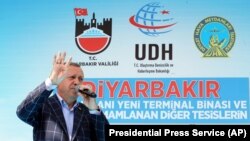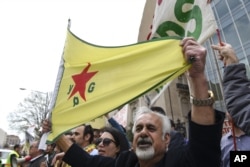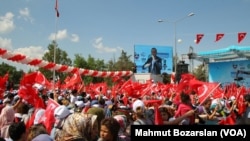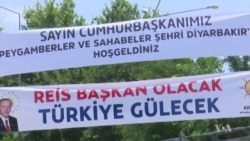Turkish President Recep Tayyip Erdogan has escalated a dispute with Washington, over images of U.S. special forces wearing Syrian Kurdish militia patches.
“The support the U.S. has given to the PYD and YPG. I condemn it,” Erdogan bellowed to a crowd at an airport opening ceremony in Diyarbakir, the main city in Turkey’s predominantly Kurdish south east.
Ankara accuses the YPG militia of being a terrorist organization connected to the Kurdish rebel group the PKK, which Turkish security forces are currently fighting.
"I am someone who believes that politics should be conducted honestly,” Erdogan chided. “Therefore, our allies, those who are with us in NATO, cannot and should not send their own soldiers to Syria, with insignias of the YPG.”
Washington argues the YPG is separate from the PKK.
Dozens of U.S. special forces are working with the YPG in Syria to support its fight against the Islamic State. The Kurdish militia is widely acknowledged as among most effective against Islamist militants in Syria.
The insignia dispute has erupted amid simmering tensions between the NATO allies over the YPG. Washington initially defended the wearing of the insignias, claiming it was part of security measures of its Special Forces allowing them to “blend in” in overseas operations.
'Unauthorized ... inappropriate'
But on Friday, Washington reached out to Ankara.
"Wearing the YPG patches was unauthorized, and it was inappropriate, and corrective action has been taken," Colonel Steve Warren, the spokesman for Operation Inherent Resolve (OIR), said on Friday. "And we have communicated as much to our military partners and our military allies in the region."
The comments came as it appeared Ankara was ready to reciprocate.
“It might be a part of strategy for camouflage,” suggested Naci Bostancı spokesman of the Turkey’s ruling AKP Party in comments seen as efforts to defuse tensions. But Erdogan’s latest attack indicates the dispute is far from over.
Sinan Ulgen, visiting scholar of the Carnegie Institute, said despite tensions, Ankara will not burn bridges with its key ally.
“Even though relations between [U.S. President Barack] Obama and Erdogan are not good, Turkey will continue to attach a great deal of important with its relationship with U.S. because that is the relationship the president values above all else," Ulgen said.
"Because in an environment where are now a number of security challenges, for Turkey and its interests the only reliable security provider is the U.S.," he added.
Cooperation between the NATO allies was underlined this month with a major a military exercise along with Poland, Azerbaijan and Pakistan. The Turkish Incirlik airbase close to the Syrian border is a key part of U.S. operations against Islamic State.
But as Ankara and Washington are diametrically opposed over the YPG, relations are likely to continue to be strained.
The Syrian Kurdish militia is increasingly drawing plaudits in its fight against Islamic State, much to Ankara’s anger.
Ankara is also aware that it is becoming increasingly isolated on the issue. In a statement after Turkey’s National Security Council, the Turkish government noted with alarm that the political wing of the Kurdish YPG militia, the PYD, had opened offices in Czech, Poland, Germany and France.
Peace process
The resumption of the peace process between Ankara and PKK is seen by observers as the best way of squaring the circle between Turkey and its Western allies over the Syrian Kurdish militia.
But Erdogan in his Diyarbakir speech on Saturday, also ruled out any let up in the war between Turkish security services and the Kurdish rebel group, the PKK.
Diyarbakir has seen of months of fighting between Kurdish rebels, and Turkish security forces, which has claimed hundreds of lives.
Over 8,000 police were deployed for the president’s visit, with fighting still continuing across Turkey’s predominantly Kurdish southeast.
VOA Turkish's Mahmut Bozarslan contributed to this report from Diyarbakir, Turkey.
Watch: Erdogan address Diyarbakir rally








